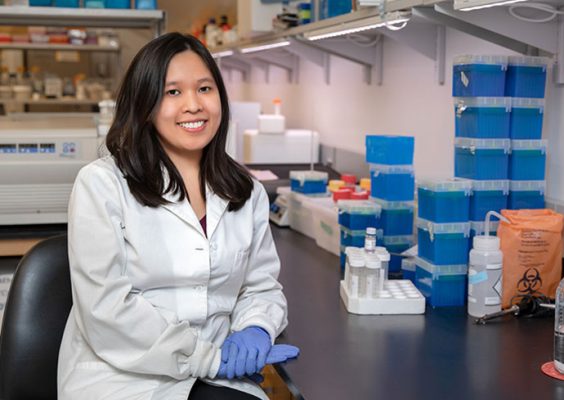Syracuse Native Finds Career in Team Science
Plansky Hoang ’15, G’20 is the youngest of seven children born to immigrant parents in Syracuse. She attended Henninger High School and came to Syracuse University as an undergraduate to major in biomedical and chemical engineering. “When I started college, my goal was to graduate and get a job in industry,” says Hoang. “I interned at a pharmaceutical company and wanted to do that kind of work.”

Plansky Hoang
Others at the University had different ideas for her. As an undergraduate, Hoang worked in Dacheng Ren’s lab. The Stevenson Endowed Professor and associate dean for research encouraged her to go to graduate school, so she applied and was accepted to Syracuse University’s Ph.D. program. When professor Zhen Ma arrived at Syracuse University in 2016, she joined his lab to follow her interest in pharmaceutical research.
Hoang earned a Ph.D. working with Ma on validating his lab’s cardiac organoid model, focusing on the drug response and fetal toxicity response of the model. She was awarded a predoctoral fellowship for this work from the American Heart Association. “Professor Ma is a very active mentor, which is great in scientific research,” Hoang says. “His lab is not so big, so I got a lot of contact with him as a graduate student. He’s open to ideas and problem solving with you.” In Ma’s lab, she learned how to build professional relationships. “This is really a team science approach and it’s great to be part of a strong team,” she adds.
Having joined the Ma lab at the beginning, Hoang ended up being the senior graduate student in the lab. “I love having the opportunity to mentor undergraduate students and the idea of training the next generation of scientists. It’s very rewarding to feel like you’re contributing to someone else’s research,” she says.
Hoang decided to stay on as a postdoctoral fellow in the Ma lab in large part because she remains interested in the research and wishes to finish work that is still underway. “I’m looking at single-cell RNA sequencing to better understand how cell types develop in the model,” says Hoang. “Knowing the genetic profile can direct how the organoids grow, so we can customize the model based on the disease or drug of interest.” The organoids are a platform where scientists can test drugs and other disease models in a living system with a huge potential to safely understand how genetic and environmental factors affect development. “To tell the truth, I’m a little possessive of the research since I was here at the beginning. I want to see it through,” Hoang says.
Her other reasons for remaining at Syracuse University as a postdoctoral student include the opportunity to continue to mentor graduate students and undergraduates and because the location allows her to stay near her elderly parents. As a first generation student, she’s also another first among her seven siblings. “I’m the first with a Ph.D. I have a sister who is a physician, a brother who is a certified public accountant,” says Hoang. “We are pretty high achieving.” She credits the University with providing world-class scientific training while also being available for family needs. “My parents like having me around. I didn’t have to compromise, I have had wonderful mentors and the opportunity to do really new and exciting research as a biomedical engineer,” she adds.
Hoang’s future career aspirations include continuing to teach or running a core laboratory facility. “I like the interaction with people who are learning how to do team science and the ability to contribute to their research,” she says.
This story was written by Ellen de Graffenreid and originally published in SU News on February 8, 2021. Original article can be found here.
